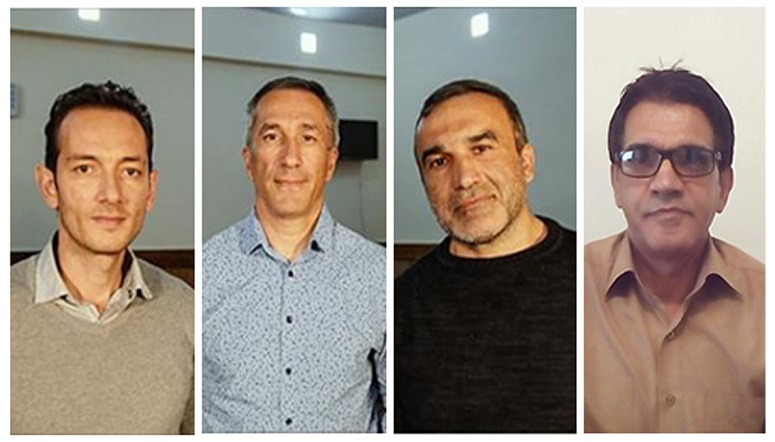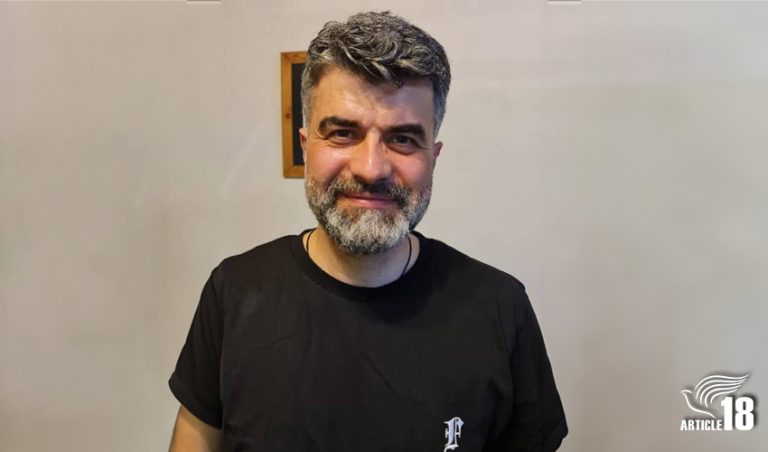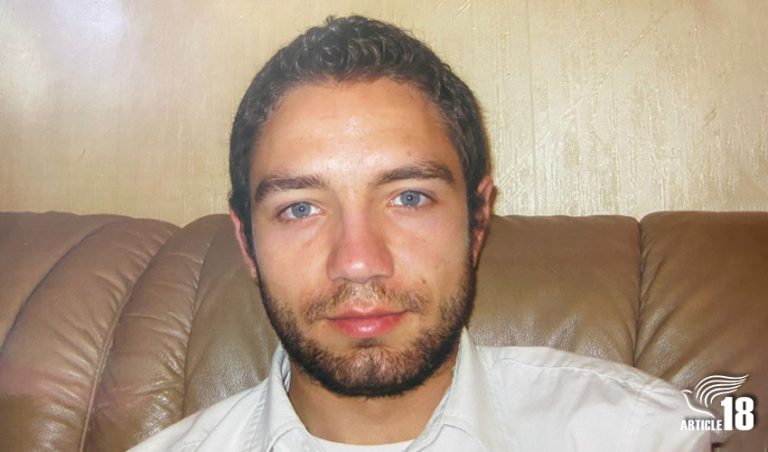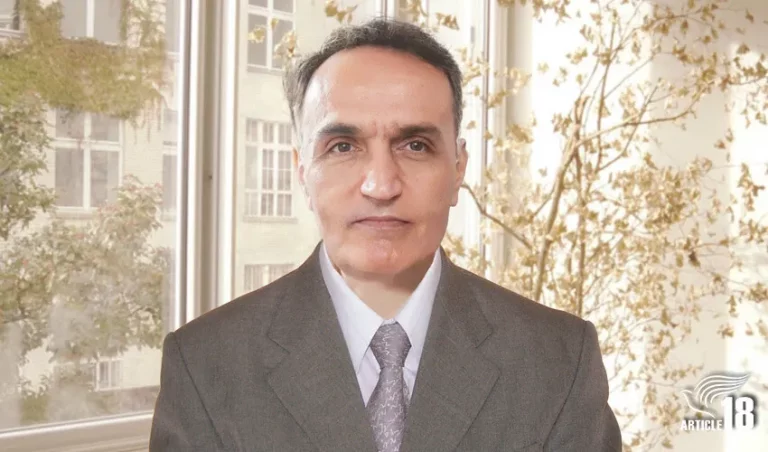
Case referenced by
Article18, Middle East Concern, Mohabat News, World Watch Monitor
Summary
On 24 June 2016, Nasser Navard Gol-Tapeh, an Iranian convert to Christianity, was arrested alongside three Christians visiting from Azerbaijan – Eldar Gurbanov, Yusif Farhadov and Bahram Nasibov – at a private gathering near Tehran. In May 2017, all four were sentenced (the Azerbaijanis in absentia) to 10 years’ imprisonment for “actions against national security”. On 20 January 2018, Nasser was taken to Evin Prison to begin his sentence. He remained in prison until 17 October 2022, when he was surprisingly “pardoned”. The Azerbaijanis remain in their home country but would face arrest and imprisonment should they return to Iran.
Case in full
On 24 June 2016, Nasser Navard Gol-Tapeh, an Iranian convert to Christianity, was arrested alongside three Christians visiting from Azerbaijan – Eldar Gurbanov, Yusif Farhadov and Bahram Nasibov – at a private gathering near Tehran. Several other Iranian Christians were also arrested during the raid by as many as 30 security agents, but they were soon released.
But Nasser and the three men from Azerbaijan were detained for over four months, including two months each in solitary confinement.
Their family members were not informed where they were being held, and they were refused access to consular assistance and legal counsel.
In September 2016 they were transferred from solitary confinement to shared cells in Ward 350 of Evin Prison.
They faced charges of engaging in missionary activity and propaganda against the regime.
On 7 November they were released on bail of 100 million tomans each (around $35,000), after which the Azerbaijanis returned to their homes and families and have not been forced to return.
On 23 May 2017, all four men were sentenced (the Azerbaijanis in absentia) at Branch 26 of the Islamic Revolutionary Court in Tehran, presided over by Judge Mashallah Ahmadzadeh, to 10 years’ imprisonment for “actions against [Iran’s] national security”, “missionary activities”, “organic relations with Sweden’s ‘Word of Life’ Church”, and what the prosecutor called “Zionist Christianity”.
They were sentenced under Article 498 of the Islamic Penal Code, which provides for punishment of between two and 10 years’ imprisonment for members of religious groups deemed to have “undermined the security of the country”, though their lawyers were not given access to the documents purported to show evidence of these crimes.
So the sentence of 10 years’ imprisonment was the harshest possible punishment they could receive, even though Nasser’s lawyer, Hussein Ahmadi-Niyaz, told Article18 the Christians’ meeting had been only religious in nature – “they prayed together and spoke about the Bible” and not at all about wanting to overthrow or undermine the security of the state.
On 12 November 2017 their sentences were upheld by Branch 36 of the Revolutionary Court in Tehran, presided over by Judge Hassan Babaee.
The judge referred to the Ministry of Intelligence in the course of the hearing. However, neither Nasser nor his lawyer were allowed access to the documents and reports cited by the prosecution.
In a strange process, the judge called on Nasser to cooperate with his interrogators from the Ministry of Intelligence, in order to reduce his sentence. However, the Ministry of Intelligence was the plaintiff and investigating body in the case.
On 20 January 2018, Nasser was taken to Evin Prison to begin his sentence. He is in Ward 8, Hall 10 of the notorious prison. The Azerbaijanis remain in their home country but will face arrest and imprisonment should they return to Iran.
In April 2018, Nasser was denied access to the emergency dental treatment he needed, with family members telling Article18 he was in danger of losing all his teeth if left untreated.
On 9 August 2018, Nasser wrote an open letter from Evin Prison to Iran’s judiciary, stating: “It’s clear to all, including the prison authorities, judges, lawyers and my fellow prisoners, that I am in prison because of my faith in Jesus Christ.”
In his letter he asked three questions:
“Would it be even possible for a committed Christian – who was born and raised in Iran and whose forefathers lived in this land for thousands of years, and who is a servant to the God who has called him to a ministry of reconciliation – to act against the national security of his own country?
“Is the fellowship of a few Christian brothers and sisters in someone’s home, singing worship songs, reading the Bible and worshiping God acting against national security?
“Isn’t it in fact a clear violation of civil and human rights, and an absolute injustice, to receive a ten-year prison sentence just for organising ‘house churches’, which are a sanctuary sanctified as a place to praise and worship God due to closure of churches in Iran?”
Nasser pleaded on numerous occasions for a retrial, parole or a reduction of his sentence, but on every occasion he was refused. Until finally, on 17 October 2022, Nasser was told he had been “pardoned”. He was released later that day.
On 6 February 2025, Nasser and fellow Christian former prisoner of conscience Joseph Shahbazian were re-arrested at their homes in the Tehran region, and taken back to Evin Prison.
On 17 March 2025, Nasser suffered a stroke in his solitary-confinement cell, having been on hunger strike since his re-arrest in protest against the continued persecution of Christians in Iran.
Nasser was rushed to the nearby Bani-Hashem Hospital, where he was treated and provided with a range of exercises to help him seek to regain movement in the left-hand side of his body.
Two days later, he was returned to the general ward of Evin Prison, where he remains detained at the time of writing, without any official charge.
Authorisation
Article18 was authorised by Nasser to conduct advocacy on his behalf. The charges against Nasser and the three Azerbaijanis were entirely unfounded and void of any legal basis. They are instead a reflection of the Islamic Republic’s security-oriented approach towards religious minorities. None of them committed any crime, nor are they seeking to act in any way against the Islamic Republic of Iran. The violations against their religious freedom and human rights is solely a result of exercising their Christian faith.
Recommendations
Article18 petitions the international community to:
- Urge the Iranian Government to uphold its obligations under its own constitution and international law, including provisions for freedom of religion or belief contained within the International Covenant on Civil and Political Rights (ICCPR), to which Iran is a state party.
- Call for the swift application of due process in the cases of all who are detained and/or awaiting charges, trials, sentences or appeal hearings on account of their Christian faith and activities.
- Support Professor Javaid Rehman, the UN Special Rapporteur on the situation of human rights in Iran, in monitoring Iran’s compliance with international human rights standards, including freedom of religion or belief.
Background
There has been a significant increase in human rights violations in Iran in recent years, and particularly in the persecution of religious minorities, principally of Christians from the Iranian “house church” movement.
Ethnic Christian communities (Assyrian and Armenian) are permitted a degree of freedom to worship, although it is illegal for these churches to conduct services in Farsi (the national language of Iran and the common language of converts). Bibles and other Christian literature are also illegal in Farsi and those found in possession of such materials, especially in sufficient quantities for distribution, can expect severe treatment and prison sentences. Therefore, the growing community of Christian converts are not permitted to attend recognised churches and they have to gather for worship in secret “house churches” and risk arrest and imprisonment.
In the past few years, a number of Christians have been handed down sentences of between 10 and 15 years, charged with offences such as “acting against national security”. These political charges are used to help avoid international outcry at religiously motivated charges such as apostasy.
Those detained or charged often have to obtain and hand over exorbitant amounts for bail, which are often forfeited as some choose to flee the country in the knowledge that they are very unlikely to receive a fair trial and just verdict. Those awaiting trial who flee the country are tried in absentia. Many will face a gruelling legal process, and until their case is heard, which could take several years, their lives are in limbo.
The majority of the Christians arrested in the last few years have been released, either after finishing their prison sentences or temporarily released on bail with severe warnings and threats against any further Christian activity. Once released, they are closely monitored, and risk re-arrest and imprisonment if they engage, or are suspected of engaging, in any Christian activity.



0 Comments
Trackbacks/Pingbacks